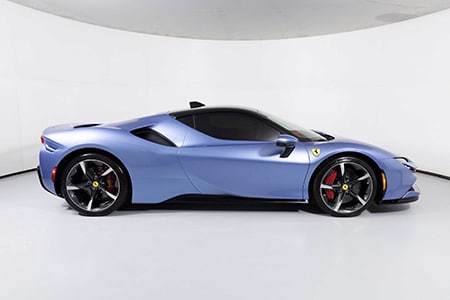
The automotive world is experiencing a revolution, with electric and hybrid technology making significant inroads into the realm of exotic cars. For decades, exotic vehicles have been defined by their roaring engines, blistering speed, and engineering prowess. Brands like Ferrari, Lamborghini, and Pagani have built their legacies on creating cars that epitomize raw power and impeccable design. However, the landscape is shifting. As environmental consciousness grows and governments around the world tighten emissions regulations, the future of exotic cars is poised to look a lot different—quieter, cleaner, and even faster.
The Rise of Electric Power in Exotic Cars
The thought of an exotic car without a growling V8 or V12 engine might seem like heresy to traditional enthusiasts. However, electric technology is redefining the concept of performance. Electric motors deliver instantaneous torque, which means blistering acceleration that can outperform many internal combustion engines (ICE). One only has to look at electric hypercars like the Rimac Nevera or Lotus Evija to see that electric power is not just an eco-friendly alternative but an evolution of performance itself.
Speed and Performance Benefits
The main advantage electric vehicles (EVs) bring to the exotic car world is torque delivery. Unlike gasoline engines that build up power gradually, electric motors provide maximum torque from a standstill, resulting in 0-60 mph times that are faster than most conventional supercars. The Rimac Nevera, for instance, can go from 0 to 60 mph in under 2 seconds—a feat once thought impossible without gasoline power.
Moreover, electric drivetrains allow for more precise control over each wheel's power output, enabling superior handling dynamics. This control, combined with advances in battery technology, means future exotic cars will not only match the performance of their gasoline-powered predecessors but exceed them in many areas.
Hybrid Technology: The Best of Both Worlds
While fully electric exotic cars are making headlines, hybrid technology is also rapidly gaining ground. Hybrid supercars blend the best of both worlds—retaining the sound and fury of a high-performance internal combustion engine while leveraging electric motors for increased power and efficiency.
Brands like Ferrari and McLaren have already embraced hybrid technology in models like the Ferrari SF90 Stradale and McLaren Artura. These vehicles combine their powerful engines with electric motors that enhance acceleration, improve fuel efficiency, and reduce emissions. Hybrid technology is a critical stepping stone for many exotic car manufacturers, allowing them to meet tightening emissions standards without sacrificing the visceral driving experience enthusiasts crave.
Enhanced Performance with Reduced Emissions
Hybrid powertrains allow exotic cars to achieve phenomenal performance figures while minimizing environmental impact. By using electric power at low speeds and for short distances, these vehicles reduce their fuel consumption and carbon footprint. When more power is needed, the gasoline engine kicks in, often in combination with the electric motor, to deliver breathtaking acceleration and top speeds.
Hybrid systems also allow for energy recovery during braking, meaning exotic cars can recharge their batteries during driving, extending their electric range and improving efficiency. This is not only great for reducing emissions but also enhances performance, as energy that would otherwise be wasted is stored for future use.
Environmental Consciousness and Government Regulations
One of the driving forces behind the shift toward electric and hybrid exotic cars is global regulation. Many countries are implementing stringent emissions laws aimed at reducing carbon footprints, with some even setting deadlines to phase out new gasoline and diesel vehicles entirely. The European Union, for example, has mandated that all new cars sold by 2035 must be zero-emission vehicles.
Exotic car manufacturers, who once thrived on creating high-emission, high-performance machines, now face the challenge of delivering the same thrilling driving experience while complying with these new laws. As a result, many are investing heavily in electric and hybrid technologies to future-proof their brands.
Sustainable Materials and Manufacturing
In addition to cleaner powertrains, many exotic car makers are exploring sustainable materials and production methods. Lightweight, eco-friendly materials like carbon fiber and recycled composites are becoming more common, helping reduce the environmental impact of car manufacturing without compromising performance. The integration of sustainable practices into the production of high-performance vehicles is an essential part of the future of exotic cars.
The Driving Experience: Will It Change?
For many, the appeal of an exotic car is not just about speed but also the visceral experience of driving. The sound of a roaring engine, the feel of the gears shifting, and the thrill of controlling a high-powered machine are all part of the magic. The transition to electric and hybrid technology brings about questions of whether this experience will change.
While electric cars lack the dramatic engine sound that gasoline engines offer, they are not entirely silent. Some manufacturers are even exploring the use of artificial engine sounds, designed to mimic the roar of traditional engines to keep the driving experience exciting. Additionally, the instantaneous acceleration and increased control provided by electric motors offer a new kind of thrill—one that may ultimately win over even the most die-hard traditionalists.
The Road Ahead for Exotic Cars
The future of exotic cars will undoubtedly be shaped by electric and hybrid technology. As we look forward, it's clear that exotic car manufacturers are embracing these innovations not just to comply with regulations but to push the boundaries of performance. Electric and hybrid supercars will be faster, cleaner, and smarter, creating new experiences for enthusiasts.
In this evolving landscape, brands like Ferrari, Lamborghini, and Porsche are already making moves to redefine their identities in a world that values sustainability and cutting-edge technology. The next generation of exotic cars will likely look different from what we’re used to, but they will be just as—if not more—thrilling.
In a few years, the silent hum of an electric motor may be just as synonymous with high performance as the roar of a V12. Exotic cars are not dying—they are evolving into something even more extraordinary.